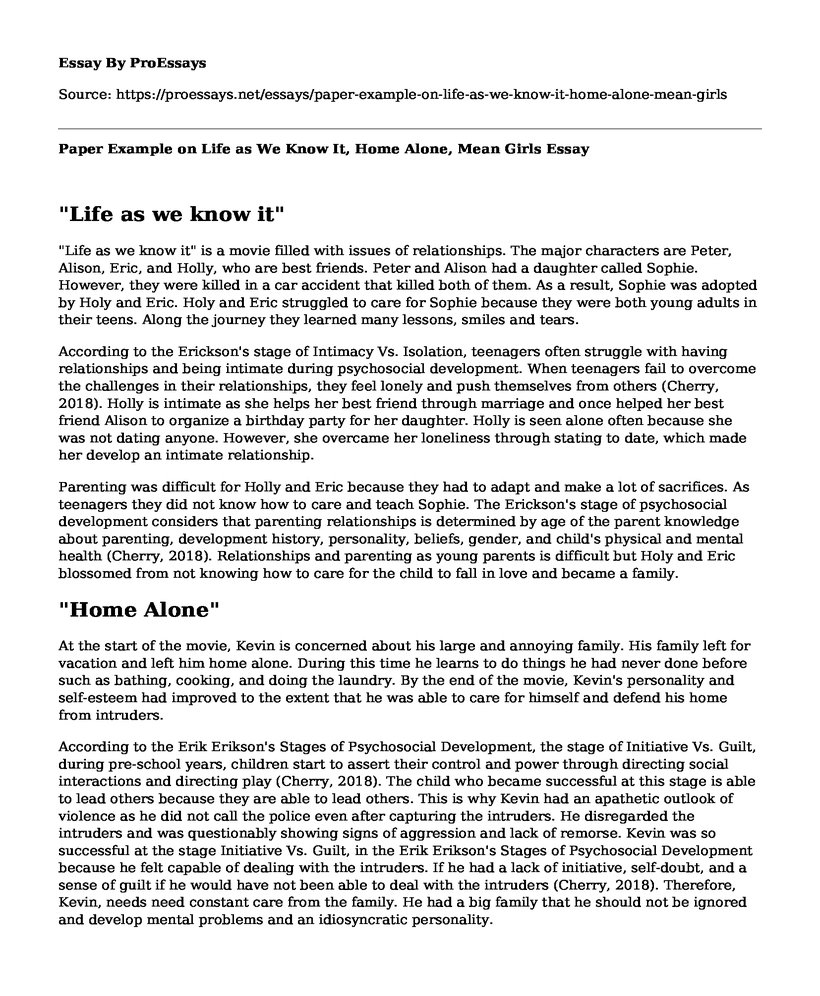"Life as we know it"
"Life as we know it" is a movie filled with issues of relationships. The major characters are Peter, Alison, Eric, and Holly, who are best friends. Peter and Alison had a daughter called Sophie. However, they were killed in a car accident that killed both of them. As a result, Sophie was adopted by Holy and Eric. Holy and Eric struggled to care for Sophie because they were both young adults in their teens. Along the journey they learned many lessons, smiles and tears.
According to the Erickson's stage of Intimacy Vs. Isolation, teenagers often struggle with having relationships and being intimate during psychosocial development. When teenagers fail to overcome the challenges in their relationships, they feel lonely and push themselves from others (Cherry, 2018). Holly is intimate as she helps her best friend through marriage and once helped her best friend Alison to organize a birthday party for her daughter. Holly is seen alone often because she was not dating anyone. However, she overcame her loneliness through stating to date, which made her develop an intimate relationship.
Parenting was difficult for Holly and Eric because they had to adapt and make a lot of sacrifices. As teenagers they did not know how to care and teach Sophie. The Erickson's stage of psychosocial development considers that parenting relationships is determined by age of the parent knowledge about parenting, development history, personality, beliefs, gender, and child's physical and mental health (Cherry, 2018). Relationships and parenting as young parents is difficult but Holy and Eric blossomed from not knowing how to care for the child to fall in love and became a family.
"Home Alone"
At the start of the movie, Kevin is concerned about his large and annoying family. His family left for vacation and left him home alone. During this time he learns to do things he had never done before such as bathing, cooking, and doing the laundry. By the end of the movie, Kevin's personality and self-esteem had improved to the extent that he was able to care for himself and defend his home from intruders.
According to the Erik Erikson's Stages of Psychosocial Development, the stage of Initiative Vs. Guilt, during pre-school years, children start to assert their control and power through directing social interactions and directing play (Cherry, 2018). The child who became successful at this stage is able to lead others because they are able to lead others. This is why Kevin had an apathetic outlook of violence as he did not call the police even after capturing the intruders. He disregarded the intruders and was questionably showing signs of aggression and lack of remorse. Kevin was so successful at the stage Initiative Vs. Guilt, in the Erik Erikson's Stages of Psychosocial Development because he felt capable of dealing with the intruders. If he had a lack of initiative, self-doubt, and a sense of guilt if he would have not been able to deal with the intruders (Cherry, 2018). Therefore, Kevin, needs need constant care from the family. He had a big family that he should not be ignored and develop mental problems and an idiosyncratic personality.
"Mean Girls"
The film depicts Erickson's adolescent stage where teenagers struggle with the issue of identity vs. role confusion. The major character in the movie is Cady, who is new at school but looking to identify himself and fit in. In the film, it shows how teenagers try to identify themselves and they use different terms to identify themselves such as the plastics, band geeks, nerds, and jocks. For example, Cady struggles to identify and overcome the challenges of being a child or growing to become an adult. The film uses the song "Grow up" to show the feelings she undergoes because she yearns to stay young forever. This is the issue that occur among teenagers of her age as they struggle through identity Vs. role confusion because they struggle to identify where they belong (Cherry, 2018). The song also shows the struggles of growing up, being identified as an adult and the struggle of taking responsibilities.
Cady is also influenced by stereotypes which gives her an overgeneralized attitude towards certain individuals. When Cady is introduced as a new student from Africa, Gretchen responds that she is White yet people from Africa are Black. But Cady shakes it off because she wants to be part of an in-group, a group that represent us vs. them mentality. Therefore, the need for conformity and obedience happens when children develop a sense of pride in their abilities and accomplishments (Cherry, 2018). Independence and a sense of self is also linked to the values, beliefs, and ideals that guide and shape an individual's behavior. Erikson consider it the ability to live by societal expectations and standards. Cady's personality gave her a cohesive and integrated sense of self, which shaped her interaction and experiences with others.
Reference
Cherry, K. (2018). Erik Erikson's stages of psychosocial development. Retrieved from http://psychology.about.com/od/psychosocialtheories/a/psychosocial_3.htm
Cite this page
Paper Example on Life as We Know It, Home Alone, Mean Girls. (2023, Jun 06). Retrieved from https://proessays.net/essays/paper-example-on-life-as-we-know-it-home-alone-mean-girls
If you are the original author of this essay and no longer wish to have it published on the ProEssays website, please click below to request its removal:
- Reflective Essay on Effects of Social Media on the Youth
- "A Time to Kill" Film Analysis Essay
- The Importance of Hairspray: The Musical to Society Essay Example
- Essay on Enhance Your Appearance With Makeup: Different Reasons for Different Women
- Documentary Analysis Essay Sample on Welcome to Leith
- Movie Analysis Essay on The Philadelphia Story
- Free Essay Example on Social Media Addiction: Impact on Mental Health & Habits







